In the enchanting island country of Cape Verde, off the coast of West Africa, lies an astonishing array of sacred natural sites and diverse biodiversity. But here’s a startling fact – Cape Verde has identified a staggering 3,512 terrestrial species, with nearly 20% of them listed as endangered on the Red List. These natural wonders are not only crucial for conservation but also provide a glimpse into the country’s rich history and cultural heritage.
Key Takeaways
- Cape Verde boasts 3,512 terrestrial species, with approximately 20% falling under the endangered category.
- The country emphasizes the importance of considering its spatially distinct islands as separate management units for preserving unique fish species and genetic resources.
- Endangered animal species are prevalent in Cape Verde, highlighting the need for robust conservation efforts.
- Cape Verde’s cultural landscapes, such as Cidade Velha, offer a fascinating blend of history, European colonial influence, and the legacy of slavery.
- Eco-tourism initiatives are driving a sustainable approach to preserving Cape Verde’s natural heritage while providing opportunities for education and community engagement.
Cape Verde’s Unique Cultural Landscapes
In addition to its diverse biodiversity, Cape Verde is also home to unique cultural landscapes. The islands of Cape Verde offer a tapestry of cultural heritage, with historical sites and traditional practices that have shaped the identity of the country.
Cidade Velha, the historic center of Ribeira Grande, is a UNESCO World Heritage site that bears witness to the history of Europe’s colonial presence in Africa and the history of slavery. The town features original street layouts, two churches, a royal fortress, and a marble pillar in Pillory Square.
“Cidade Velha serves as a reminder of Cape Verde’s past and the lasting impact of colonization.”
Cape Verde recognizes the importance of preserving its cultural landscapes while promoting sustainable development. Efforts are being made to integrate biodiversity conservation, cultural heritage preservation, and sustainable tourism into the country’s strategies, policies, and plans for future growth.
Preserving Cultural Heritage and Promoting Sustainable Development
Cape Verde is committed to preserving its cultural heritage and promoting sustainable development. The country acknowledges that cultural landscapes are not only valuable for their historical and aesthetic significance but also for their potential to contribute to sustainable tourism and economic growth.
- Sustainable Tourism: Cape Verde is working towards developing a sustainable tourism sector that showcases its cultural landscapes. By promoting responsible tourism practices, the country aims to minimize the negative impact on the environment and local communities while maximizing the benefits for all stakeholders.
- Biodiversity Conservation: Cape Verde recognizes the intrinsic link between cultural landscapes and biodiversity. Efforts are underway to protect and preserve the natural habitats and ecosystems that are integral to the cultural heritage of the islands.
- Community Engagement: Local communities play a crucial role in the preservation and promotion of Cape Verde’s cultural landscapes. Recognizing the value of traditional knowledge and practices, Cape Verde encourages community engagement and empowerment in decision-making processes.
The integration of biodiversity conservation, cultural heritage preservation, and sustainable tourism ensures that Cape Verde’s unique cultural landscapes can be enjoyed by future generations while promoting the sustainable development of the country.
Cultural Landscapes: Connecting Past and Present
The cultural landscapes of Cape Verde provide a connection between the past and the present, shaping the country’s identity and fostering a sense of pride and belonging among its people. The preservation and promotion of these landscapes serve as a testament to the historical and cultural significance of Cape Verde.
“Cape Verde’s cultural landscapes tell the story of the country’s rich history and the resilience of its people.”
By safeguarding these landscapes, Cape Verde is not only preserving its cultural heritage but also contributing to the sustainable development of the country. The promotion of sustainable tourism and the engagement of local communities ensure that the benefits of cultural landscapes are shared by all, creating a more inclusive and prosperous future.
Endangered Species Protection in Cape Verde
Protecting endangered species is a crucial aspect of Cape Verde’s commitment to biodiversity conservation. The country has identified a significant number of endangered species, particularly in the animal kingdom, that require immediate attention and protection. To ensure their survival, wildlife conservation initiatives in Cape Verde focus on research, monitoring, and habitat preservation.
Cape Verde is home to a diverse range of species, including endemic ones and migratory birds, that play a vital role in maintaining the balance of the country’s ecosystems. These unique fauna contribute to the overall health and resilience of Cape Verde’s natural heritage.
Local organizations and conservation projects play a crucial role in enforcing fishing regulations, protecting marine ecosystems, and raising awareness about the importance of wildlife conservation. Their tireless efforts promote sustainable practices and ensure the survival of endangered species in Cape Verde.
“Our conservation efforts aim to secure a future where endangered species thrive and contribute to the ecological richness of Cape Verde.”
Through comprehensive measures and collaborative partnerships, Cape Verde is working towards the preservation of its natural heritage for future generations. By protecting endangered species, Cape Verde aspires to create a sustainable environment that continues to inspire awe and wonder.
The Importance of Wildlife Conservation
Wildlife conservation is not only essential for protecting individual species but also for maintaining the overall health of ecosystems. When species become endangered, it is often an indication of an imbalance in their habitats. By safeguarding these endangered species, Cape Verde aims to preserve the delicate and interconnected web of life that exists within its borders.
Additionally, wildlife conservation plays a vital role in ecotourism, attracting visitors who value the opportunity to experience nature and support sustainable practices. The conservation of endangered species contributes to the economic growth of Cape Verde, promoting a harmonious relationship between environmental preservation and socioeconomic development.
The Role of Marine Ecosystems
Cape Verde’s marine ecosystems are of particular importance for wildlife conservation. These ecosystems provide critical habitats for a variety of fish species, marine mammals, and sea turtles. The protection of marine ecosystems is crucial for the survival and wellbeing of these vulnerable species.
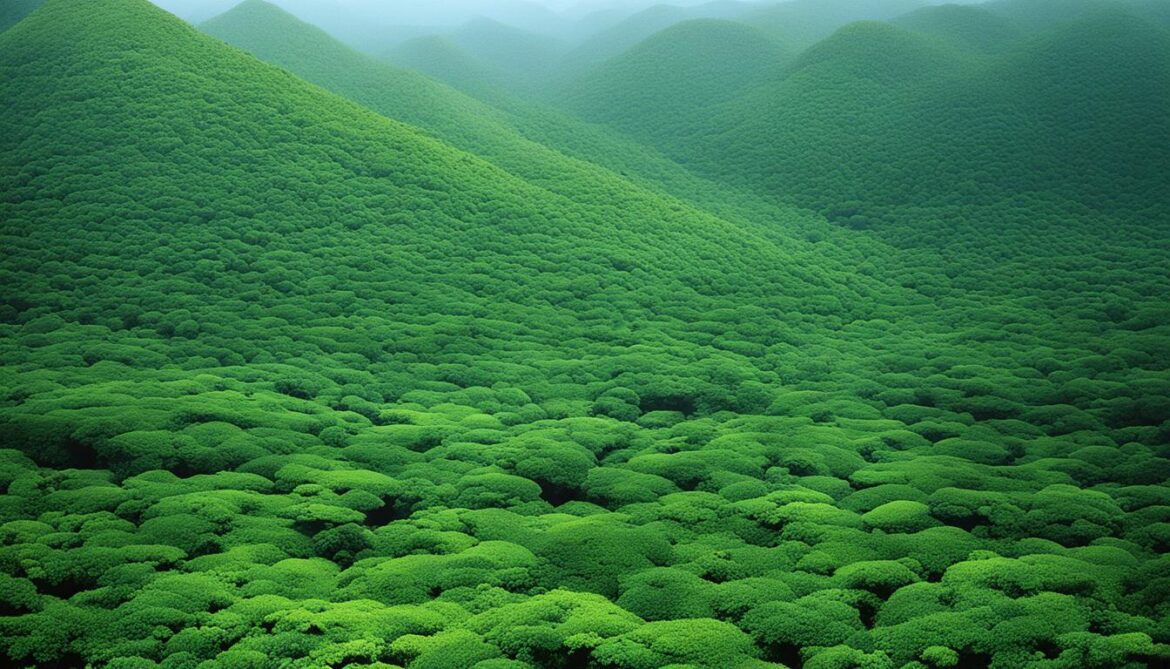
Efforts to conserve Cape Verde’s marine ecosystems encompass various strategies, including the establishment of marine protected areas, the enforcement of fishing regulations, and the promotion of sustainable fishing practices. By implementing these measures, Cape Verde aims to protect the biodiversity and ecological balance of its coastal areas.
The Way Forward
As Cape Verde continues its journey towards environmental sustainability, the protection of endangered species remains a priority. Ongoing research and monitoring efforts in collaboration with local communities and international partners contribute to the success of wildlife conservation initiatives.
Together, these collective efforts ensure that Cape Verde’s natural heritage and its rich biodiversity are preserved for future generations to appreciate and cherish. By safeguarding endangered species, Cape Verde not only protects its unique ecosystems but also demonstrates its commitment to responsible environmental stewardship.
Eco-tourism Initiatives in Cape Verde
Cape Verde is committed to embracing eco-tourism as a sustainable development strategy while preserving its natural heritage. The country’s breathtaking landscapes, diverse biodiversity, and rich cultural sites make it an attractive destination for responsible travelers seeking authentic experiences.
Eco-tourism in Cape Verde revolves around promoting activities that have minimal ecological impact and provide opportunities for education, conservation, and community engagement. Visitors can immerse themselves in marine and coastal eco-tourism, which includes snorkeling, diving, and wildlife observation.
The local communities play a crucial role in promoting eco-tourism initiatives, offering visitors unforgettable cultural experiences and contributing to the economic development of Cape Verde.
Preserving Cape Verde’s Natural Heritage
Preserving the natural heritage of Cape Verde is at the core of eco-tourism initiatives. By providing sustainable alternatives to traditional tourism, the country aims to protect and conserve its unique ecosystems for future generations.
Through eco-tourism, visitors have the opportunity to explore the pristine beauty of Cape Verde’s natural landscapes while minimizing their impact on the environment. Tour operators and guides prioritize responsible practices and educate visitors on the importance of preserving the biodiversity and fragile ecosystems of the islands.
“Eco-tourism is a powerful tool that allows us to showcase the natural beauty of Cape Verde while encouraging conservation and sustainable development.” – Ana Silva, Eco-tourism Coordinator
As eco-tourism continues to thrive in Cape Verde, environmental preservation and community development go hand in hand. Local communities are actively involved in the planning and execution of eco-tourism activities, providing an authentic glimpse into the vibrant Cape Verdean culture and heritage.
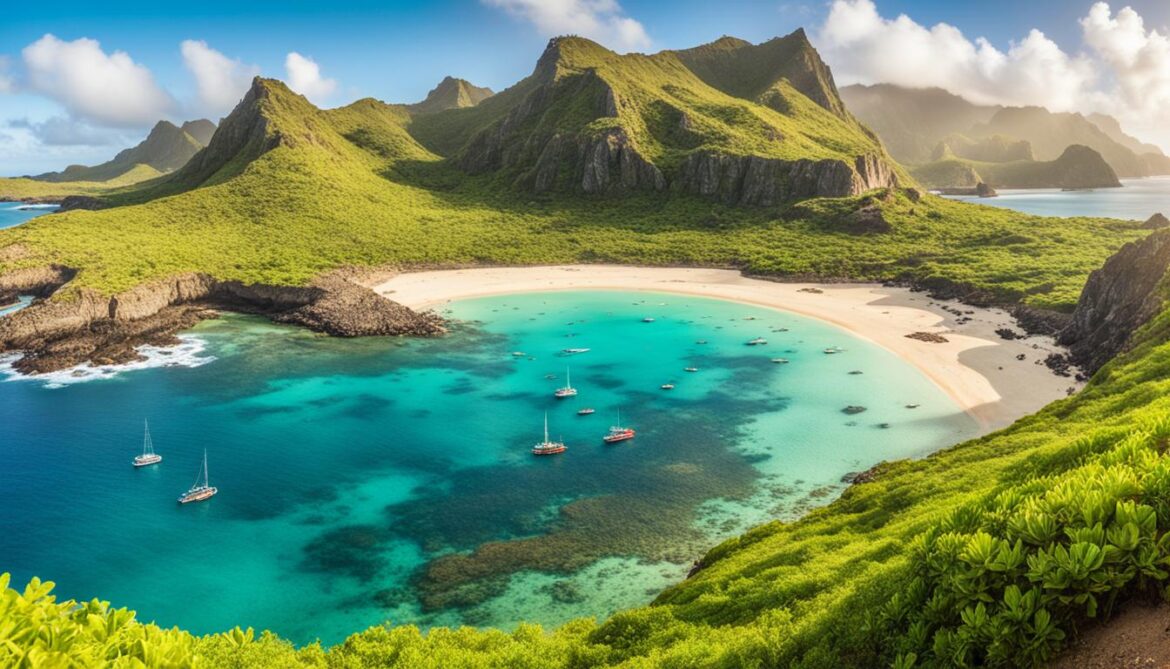
The Benefits of Eco-tourism in Cape Verde
Eco-tourism not only promotes the preservation of Cape Verde’s natural heritage but also brings significant benefits to the local communities and the country’s economy as a whole.
- Sustainable economic growth: Eco-tourism provides a source of income for local communities, creating economic opportunities beyond traditional industries.
- Preservation of cultural heritage: By actively engaging visitors in cultural activities and experiences, Cape Verde preserves its rich history and traditions for future generations.
- Conservation of biodiversity: Eco-tourism initiatives prioritize the protection and conservation of Cape Verde’s unique ecosystems, ensuring the long-term sustainability of its natural resources.
- Environmental education: Visitors gain a deeper understanding of the importance of environmental conservation, inspiring them to adopt sustainable practices even after leaving Cape Verde.
- Community empowerment: Eco-tourism initiatives involve local communities, providing them with opportunities for economic empowerment, cultural preservation, and wider community development.
Exploring Cape Verde Sustainably
When visiting Cape Verde, responsible travelers can make a positive impact by following these eco-friendly practices:
- Choose eco-certified accommodations and tour operators that prioritize sustainability.
- Respect local customs, traditions, and natural sites.
- Minimize waste and dispose of it responsibly.
- Conserve water and energy wherever possible.
- Support local initiatives and businesses that promote conservation and community development.
By embracing eco-tourism, Cape Verde is transforming its tourism industry into a force for positive change. With the preservation of its natural heritage and the empowerment of local communities at the forefront, Cape Verde is setting the stage for a sustainable future.
Environmental Stewardship in Cape Verde
Cape Verde recognizes the importance of environmental stewardship in ensuring the long-term sustainability of its natural resources. Efforts are being made to improve environmental awareness, increase knowledge about biodiversity, and promote responsible practices among the population.
By prioritizing environmental citizenship, Cape Verde seeks to foster a sense of responsibility towards the environment and empower individuals to become active participants in sustainable development.
Education and Awareness
One of the key strategies in Cape Verde’s environmental stewardship is to enhance education and awareness about the importance of protecting the environment. Through various initiatives and campaigns, the population is informed about the value of biodiversity, the impacts of climate change, and the significance of preserving natural habitats.
Public schools play a vital role in instilling a sense of environmental responsibility in the younger generation, emphasizing topics such as conservation, sustainability, and climate change adaptation.
Community Involvement
Cape Verde places great emphasis on involving communities in environmental stewardship initiatives. By engaging local communities, the country aims to create a sense of ownership and shared responsibility for the environment.
Community-based organizations are encouraged to participate in environmental conservation efforts, such as tree planting, beach clean-ups, and recycling programs. These initiatives promote a sense of unity and collective action towards preserving Cape Verde’s natural resources.
“The conservation of nature and the environment is a collective responsibility. We must all play our part in ensuring a sustainable future for Cape Verde.” – Minister of Environmental Affairs
Sustainable Practices
Cape Verde promotes the adoption of sustainable practices in various sectors, including tourism, agriculture, and fishing. The government has implemented regulations and guidelines to ensure that these industries operate in an environmentally responsible manner.
For instance, sustainable agricultural practices, such as organic farming and water conservation methods, are encouraged to minimize the use of harmful chemicals and preserve the integrity of the soil.
In the tourism sector, eco-friendly accommodations and tour operators are supported, providing visitors with opportunities to experience Cape Verde’s natural beauty while minimizing their impact on the environment.
Environmental Awareness and Stewardship in Cape Verde
Cape Verde is committed to promoting environmental stewardship and raising environmental awareness among its population. The country recognizes that protecting the environment is crucial for the long-term sustainability of its natural resources.
Efforts are underway to educate individuals and communities about the importance of biodiversity and sustainable practices. These initiatives aim to foster a sense of responsibility towards the environment and encourage active participation in conservation.
Education and Outreach
Cape Verde prioritizes environmental education to instill a sense of environmental stewardship in its citizens. Schools play a vital role in teaching students about biodiversity, climate change, and the significance of preserving the environment.
Community outreach programs, workshops, and educational campaigns are organized to raise awareness about the threats facing the environment and the actions individuals can take to mitigate them.
Community Engagement
Engaging local communities is essential for effective environmental stewardship. Cape Verde encourages community involvement in conservation efforts, empowering individuals to contribute to the protection of natural resources.
Through collaboration with local organizations, Cape Verde fosters a sense of ownership and responsibility among communities, enabling them to actively participate in sustainable development initiatives.
“Preserving our environment is not just the responsibility of the government; it is a collective effort, and each of us can make a difference through our actions.” – Environmental Activist
Promoting Sustainable Practices
Cape Verde promotes sustainable practices in various sectors, including tourism, agriculture, and energy. The country encourages responsible tourism, supporting initiatives that minimize the environmental impact of visitors while promoting the cultural heritage and natural beauty of Cape Verde.
In agriculture, sustainable farming techniques, such as organic farming and water conservation, are encouraged to protect soil quality, reduce chemical use, and promote biodiversity.
Furthermore, Cape Verde is investing in renewable energy sources to reduce its carbon footprint and promote a cleaner environment.
Environmental Stewardship in Cape Verde
Cape Verde places great importance on environmental stewardship to ensure the long-term sustainability of its natural resources. The country is taking steps to improve environmental awareness and promote responsible practices among its population.
Enhancing environmental awareness is key to fostering a sense of responsibility and encouraging individuals to actively participate in conservation efforts in Cape Verde.
Environmental Education
Cape Verde is focused on educating its population about the importance of environmental stewardship. Environmental education programs are implemented in schools to raise awareness about biodiversity, climate change, and the significance of preserving the environment.
The government also organizes workshops, seminars, and public awareness campaigns to inform citizens about the threats facing the environment and the role they can play to protect it.
Community Engagement
Cape Verde recognizes the power of community engagement in environmental stewardship. Local communities are encouraged to actively participate in conservation efforts through community-based organizations and initiatives.
By involving communities in decision-making processes and providing them with the necessary resources, Cape Verde aims to create a sense of ownership and responsibility for the environment.
“Preserving the environment is not just the responsibility of the government, but of each individual. Together, we can make a difference.” – Environmental Advocate
Sustainable Practices
Cape Verde promotes the adoption of sustainable practices across various sectors. The government has implemented regulations and guidelines to ensure that industries operate in an environmentally responsible manner.
Efforts are being made to encourage sustainable agriculture practices, eco-friendly tourism, and the use of renewable energy sources. By incorporating sustainability into daily practices, Cape Verde is working towards a greener and more sustainable future.
Environmental Stewardship in Cape Verde
Cape Verde recognizes the importance of advocating environmental stewardship to ensure the long-term preservation of its natural resources. The country is dedicated to raising environmental awareness and encouraging responsible behaviors among its population.
By improving environmental education and promoting community engagement, Cape Verde aims to empower individuals and communities to actively participate in sustainable development and environmental conservation.
Environmental Education and Awareness
Environmental education plays a crucial role in promoting environmental stewardship in Cape Verde. Schools and educational institutions provide knowledge about biodiversity, climate change, and the importance of preserving the environment.
In addition to formal education, awareness campaigns and workshops are organized to engage the public, ensuring that citizens are well-informed about the challenges and opportunities for environmental sustainability.
Community Participation and Engagement
Cape Verde recognizes that environmental stewardship requires collective efforts. The country actively encourages community participation and engagement in environmental conservation and sustainability initiatives.
Local communities are involved in decision-making processes, allowing them to contribute their perspectives and ideas to shape environmental policies. Community-led projects, such as waste management, reforestation, and conservation initiatives, provide opportunities for residents to actively contribute to the well-being of their environment.
“Every small action counts. By promoting environmental stewardship at the community level, we can collectively make a significant impact on the sustainability of Cape Verde’s natural resources.” – Environmental Activist
Promoting Responsible Practices
Cape Verde emphasizes the importance of responsible practices to minimize environmental impact. The country aims to promote sustainable agriculture, eco-tourism, and renewable energy sources.
By implementing sustainable practices, Cape Verde seeks to strike a balance between socio-economic development and environmental conservation, ensuring a greener and more sustainable future for generations to come.
Environmental Stewardship in Cape Verde
Cape Verde understands the significance of environmental stewardship in safeguarding its natural resources for future generations. The country is actively working towards enhancing environmental awareness among its population and promoting responsible practices.
An important aspect of environmental stewardship in Cape Verde is to improve knowledge and understanding of biodiversity and its conservation. By educating individuals about the importance of preserving the environment, the country aims to foster a sense of responsibility towards nature.
Education for Environmental Awareness
Cape Verde is investing in environmental education programs to raise awareness and understanding of environmental issues. Schools and educational institutions play a key role in teaching students about biodiversity, sustainable development, and the necessity of protecting natural resources.
In addition, public awareness campaigns, workshops, and seminars are conducted to reach a wider audience and disseminate information about the environment.
Community-Based Initiatives
Cape Verde actively encourages community involvement in environmental stewardship. Engaging local communities in conservation efforts allows for a collective approach to protecting the environment.
The country supports community-based initiatives such as tree planting, beach clean-ups, and recycling programs. These initiatives not only contribute to environmental conservation but also promote a sense of ownership and responsibility among community members.
“Environmental stewardship is a commitment we all share. Together, we can make a positive impact and ensure a sustainable future for Cape Verde.” – Environmental Advocate
Promoting Responsible Practices
Cape Verde places an emphasis on promoting responsible practices that minimize the impact on the environment. The country encourages sustainable agriculture, eco-friendly tourism, and the use of renewable energy sources.
By adopting responsible practices, Cape Verde aims to strike a balance between economic development and environmental sustainability.
Environmental Stewardship in Cape Verde
Cape Verde is dedicated to promoting environmental stewardship to ensure the long-term well-being of its natural resources. The country recognizes the importance of environmental awareness in inspiring responsible practices among its population.
By fostering a sense of appreciation and responsibility towards the environment, Cape Verde aims to empower individuals to actively contribute to sustainable development.
Enhancing Environmental Awareness
Cape Verde prioritizes environmental education to increase awareness about the importance of environmental conservation. Schools and educational institutions play a crucial role in educating students about biodiversity, climate change, and sustainable practices.
Community engagement programs and public awareness campaigns further enhance environmental awareness, equipping citizens with the knowledge and tools to make informed decisions for the benefit of the environment.
Encouraging Responsible Practices
Cape Verde encourages individuals and communities to adopt responsible practices that minimize their impact on the environment. The country promotes sustainable practices in various sectors, including agriculture, energy, and tourism.
By emphasizing the importance of sustainable agriculture, renewable energy sources, and responsible tourism, Cape Verde seeks to preserve its natural resources for future generations to enjoy.
“Protecting the environment is not a choice; it is a responsibility we owe to the future generations who will inherit this land.” – Environmental Activist
Engaging the Community
Cape Verde recognizes that environmental stewardship requires collective action. The country actively engages the community through participatory programs, community-driven conservation projects, and partnerships with local organizations.
By involving the community in decision-making processes and empowering individuals to take ownership of their environment, Cape Verde fosters a sense of responsibility and unity in protecting its natural heritage.
Environmental Stewardship in Cape Verde
In Cape Verde, environmental stewardship plays a crucial role in ensuring the sustainability of the country’s natural resources. Recognizing the significance of environmental awareness, Cape Verde is actively promoting responsible practices among its population.
By fostering environmental citizenship and encouraging community involvement, Cape Verde aims to create a culture of environmental responsibility and sustainable development.
Environmental Education and Awareness
Cape Verde is committed to improving environmental education and awareness to instill a sense of environmental stewardship in its citizens. By educating individuals about biodiversity, climate change, and the importance of environmental preservation, Cape Verde seeks to raise awareness about the need for sustainable practices.
Environmental awareness campaigns, workshops, and educational programs are organized to engage the public and equip them with the knowledge and skills needed to make informed decisions.
Community Engagement
Community engagement is a key aspect of environmental stewardship in Cape Verde. The country actively involves local communities in conservation initiatives and encourages community-led projects.
Through community involvement, Cape Verde aims to empower individuals to become active participants in sustainable development and environmental conservation.
“Protecting the environment is not just the responsibility of the government; it is a collective effort that requires the engagement of every individual.” – Environmental Advocate
Promoting Responsible Practices
Cape Verde promotes responsible practices that minimize the impact on the environment. The country encourages sustainable agriculture, eco-friendly tourism, and the use of renewable energy sources.
By incorporating responsible practices into various sectors, Cape Verde aims to achieve a balance between economic development and environmental preservation.
Environmental Stewardship in Cape Verde
Cape Verde recognizes the importance of environmental stewardship in safeguarding its natural resources and promoting sustainable development. The country is actively working towards enhancing environmental awareness and fostering responsible practices among its population.
Education and community involvement are key strategies employed by Cape Verde to encourage active participation in environmental stewardship initiatives.
Fostering Environmental Awareness
Cape Verde is committed to raising environmental awareness among its citizens. The country prioritizes environmental education in schools, teaching students about biodiversity, climate change, and the importance of preserving natural resources.
Public awareness campaigns, workshops, and seminars are also conducted to engage the wider population and promote a greater understanding of environmental issues.
Empowering Communities
Cape Verde believes in the power of community involvement in environmental stewardship. The country actively engages local communities in decision-making processes and encourages their participation in conservation efforts.
The government supports community-driven initiatives, such as tree planting programs and conservation projects, that empower individuals to take ownership of their environment and contribute to its preservation.
“Environmental stewardship is a responsibility we all share. By working together, we can make a positive impact on the conservation of Cape Verde’s natural resources.” – Environmental Advocate
Encouraging Responsible Practices
Cape Verde promotes responsible practices that minimize the impact on the environment. The country encourages sustainable agriculture, eco-friendly tourism, and the use of renewable energy sources.
By adopting responsible practices, Cape Verde aims to achieve a harmonious balance between economic development and the preservation of its natural heritage.
The Beauty of Blue Eye Cave in Cape Verde
Blue Eye Cave, also known as “Olho Azul,” is a captivating natural wonder located on the island of Santiago in Cape Verde. This hidden gem is surrounded by the rugged coastline and can be accessed by boat or a short hike along the shoreline.
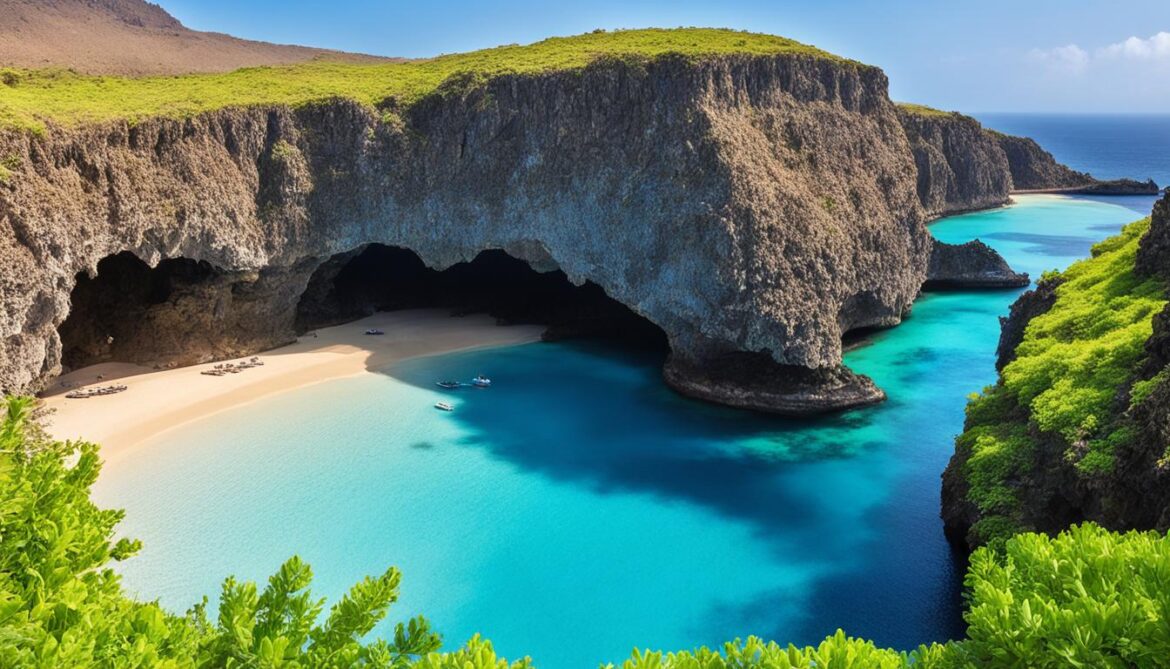
The cave gets its name from the stunning blue color of its waters, which shimmer with an otherworldly glow when illuminated by sunlight. Inside the cave, visitors are greeted by shafts of sunlight that create ethereal patterns of light and shadow on the walls. The crystal-clear waters and ancient rock formations make Blue Eye Cave a popular attraction for nature enthusiasts and adventurers visiting Cape Verde.
Exploring the Depths of Blue Eye Cave
Blue Eye Cave offers an unparalleled opportunity for exploration and discovery. As visitors venture deeper into the cave, they will be enthralled by the hidden chambers, passageways, and secluded alcoves that await them. These tranquil spaces provide moments of reflection, allowing visitors to forge a deeper connection with the natural world surrounding them.
However, Blue Eye Cave’s allure extends far beyond its visual appeal. This captivating cave is home to a diverse array of marine life, making it a haven for snorkeling and diving enthusiasts. As adventurers explore the underwater world surrounding the cave, they will encounter vibrant coral reefs and encounter a myriad of colourful fish and graceful sea turtles. The vibrant marine ecosystem teeming with life is a perfect juxtaposition to the serene beauty of the cave itself.
Exploring the depths of Blue Eye Cave is an opportunity to witness the breathtaking beauty and biodiversity of Cape Verde’s natural landscapes. Whether savouring moments of solitude in the secluded chambers or delving into the vibrant underwater world, this adventure is sure to leave lifelong memories and a profound appreciation for the wonders of nature.
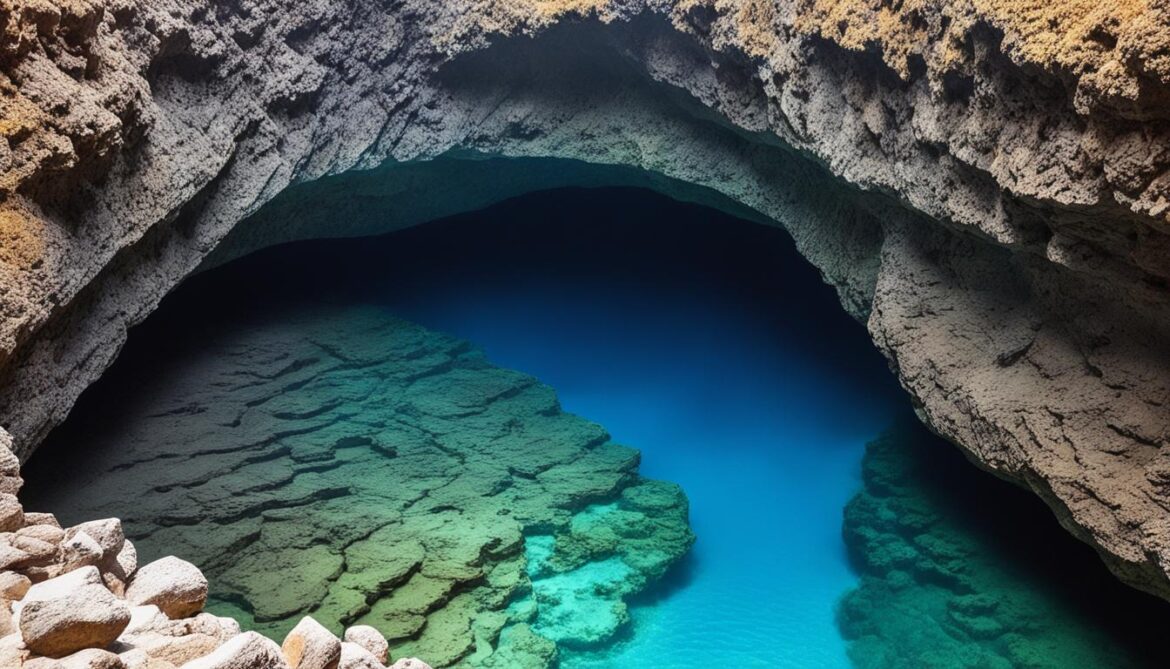
The Depths of Blue Eye Cave: A Closer Look
“The crystal-clear waters and ancient rock formations inside Blue Eye Cave create an otherworldly ambiance, enticing visitors to delve deeper into its depths. It’s hard to describe the feeling of being inside the cave, surrounded by the ethereal play of light and shadow. Each step reveals new wonders and leaves you in awe of Cape Verde’s natural splendour.” – Maria Silva, Cave Explorer
| Marine Life |
Highlights |
| Colorful fish |
Swim alongside schools of vibrant fish in a kaleidoscope of colours. |
| Sea turtles |
Observe majestic sea turtles gracefully gliding through the underwater world. |
| Vibrant coral reefs |
Marvel at the stunning variety of coral formations and the diverse marine ecosystems they support. |
Cultural Significance of Blue Eye Cave
Blue Eye Cave holds cultural and historical significance for the people of Cape Verde. Local legends and folklore speak of ancient civilizations and mystical beings that once inhabited the depths of the cave. The cave is considered a gateway to the spirit world, where ancestral spirits are believed to reside, watching over the island’s inhabitants. The entrance of Blue Eye Cave is a gathering place for traditional rituals and ceremonies performed by the local community. Fishermen offer prayers and blessings to the sea gods before setting out on their fishing expeditions, seeking protection and guidance from the forces of nature. The cultural significance of Blue Eye Cave adds another layer of enchantment to this natural wonder.
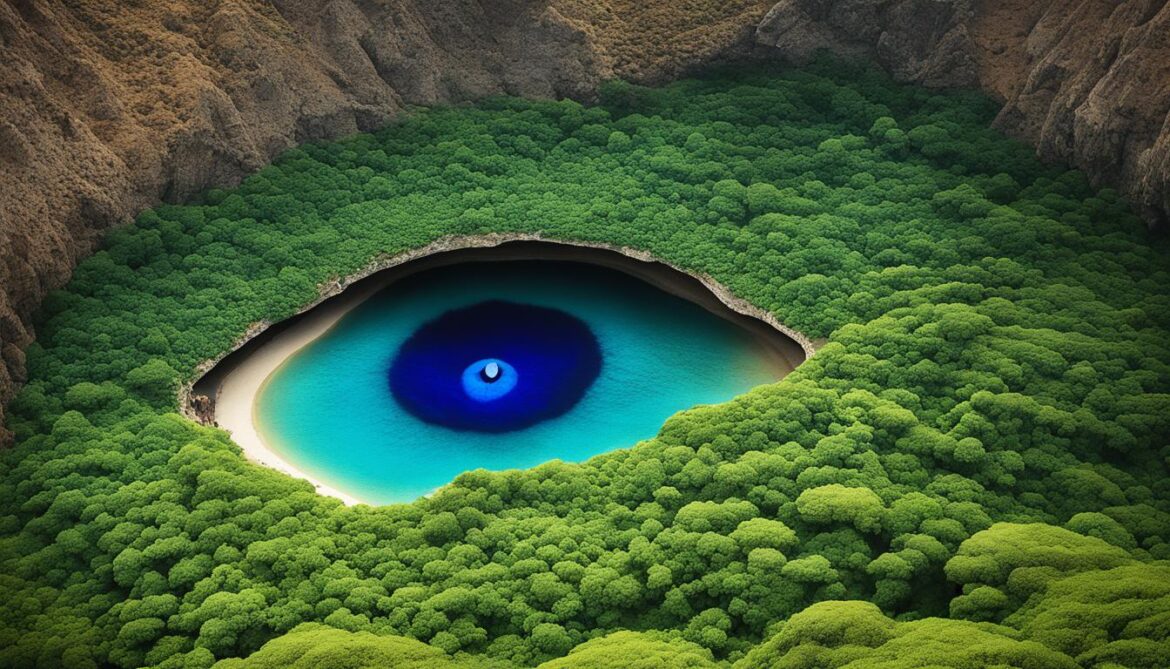
The Legend of Blue Eye Cave
“Throughout generations, the people of Cape Verde have shared stories of the mystical Blue Eye Cave, speaking of an ancient civilization that once thrived within its depths. Legends point to mystical beings who guarded the entrance, ensuring the safety and prosperity of the island. Today, the cave remains a sacred and revered place, where local rituals and ceremonies pay homage to the spirits that dwell within.”
Cultural Rituals and Traditions
The local community in Cape Verde holds deep reverence for Blue Eye Cave and its spiritual significance. The entrance of the cave becomes a place of gathering and celebration during traditional rituals and ceremonies. Fishermen, before embarking on their fishing expeditions, offer prayers and blessings to the sea gods, seeking protection and bountiful catches. They believe that the spirits residing in the cave hold the power to guide and safeguard their journeys. These cultural practices connect the community to their ancestral heritage and reinforce their close relationship with nature.
Traditional Beliefs and Ancestral Spirits
According to Cape Verdean folklore, the spirits of ancestors are believed to reside within Blue Eye Cave, acting as protectors and watchers over the island’s inhabitants. These ancestral spirits are held in high regard, offering guidance, wisdom, and a connection to the past. The cave is seen as a sacred place where one can communicate with the spirit world, seeking their blessings and guidance in various aspects of life. The belief in ancestral spirits reflects the deep-rooted cultural heritage of Cape Verde and its connection to the natural world.
| Time-honored Traditions |
Symbolism |
| Rituals performed at the cave entrance |
Connection to ancestral spirits |
| Prayers and blessings before fishing expeditions |
Seeking protection and guidance from the sea gods |
| Belief in ancient civilizations in the cave |
Sense of mystery and wonder surrounding Blue Eye Cave |
Conservation Efforts for Blue Eye Cave
Conservation efforts are crucial for protecting the delicate marine ecosystems surrounding Blue Eye Cave in Cape Verde. Local organizations, such as Biosfera Cabo Verde and Project Biodiversity, play a vital role in monitoring and preserving the environmental integrity of this majestic natural wonder.
One of the primary focuses of these conservation efforts is monitoring water quality in the area. By closely monitoring the health and composition of the water, these organizations can assess any potential threats or changes that could impact the marine ecosystems within and surrounding Blue Eye Cave.
In addition to water quality, enforcing fishing regulations is paramount to maintaining the delicate balance of the marine ecosystems. By working closely with local fishermen, Biosfera Cabo Verde and Project Biodiversity ensure that sustainable fishing practices are followed, minimizing the impact on marine life and preserving the biodiversity of the cave’s surroundings.
Another critical element of these conservation efforts is raising awareness about the importance of marine conservation. Through educational initiatives, organized events, and community outreach programs, these organizations aim to instill a sense of environmental stewardship among the local community and visitors alike. By fostering a deeper understanding of the fragility and value of these marine ecosystems, they hope to inspire conservation actions that will preserve the natural beauty of Blue Eye Cave for generations to come.
By integrating biodiversity conservation and cultural heritage preservation, Cape Verde is taking a holistic approach to environmental conservation. The country recognizes that protecting the marine ecosystems around Blue Eye Cave is not only crucial for biodiversity but also for maintaining the cultural significance of this natural wonder. Balancing the needs of the environment and the local community, Cape Verde is striving for sustainable development that ensures the long-term preservation of its natural and cultural heritage.
| Conservation Efforts |
Description |
| Monitoring Water Quality |
Biosfera Cabo Verde and Project Biodiversity closely monitor the water quality in and around Blue Eye Cave to assess any potential threats or changes to the marine ecosystems. |
| Enforcing Fishing Regulations |
Local organizations work with fishermen to enforce sustainable fishing practices and minimize the impact on marine life, preserving the biodiversity of the cave’s surroundings. |
| Raising Awareness |
Through educational initiatives and community outreach programs, efforts are being made to raise awareness about the importance of marine conservation and foster environmental stewardship. |
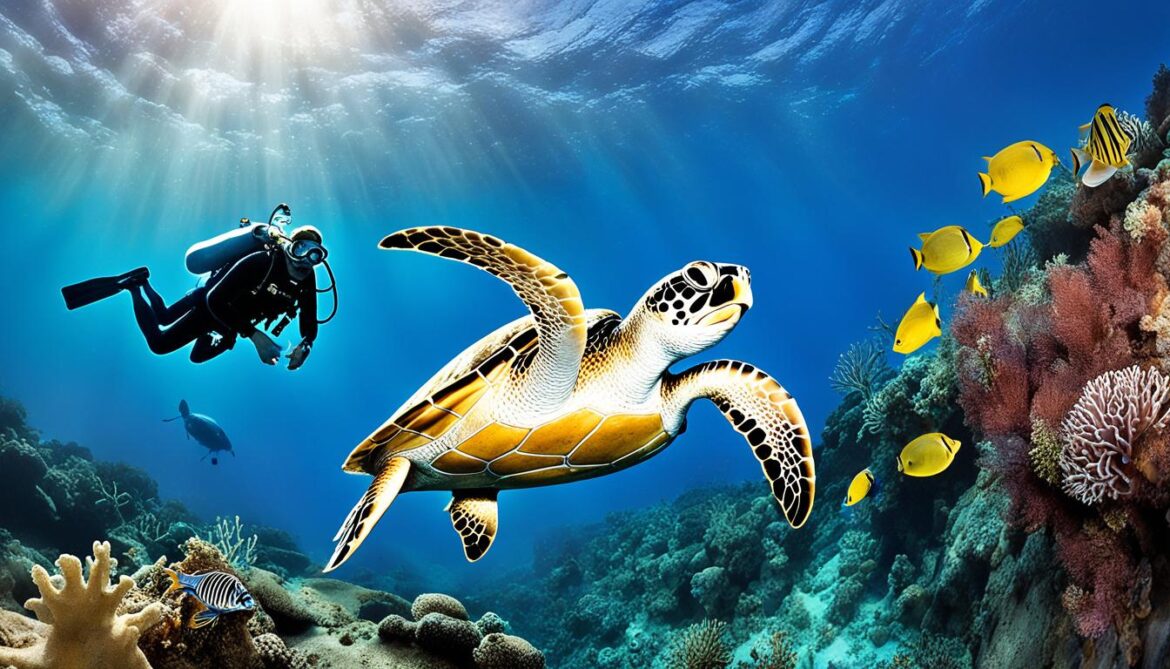
Conserving the marine ecosystems of Blue Eye Cave in Cape Verde is a collaborative effort between local organizations, the community, and visitors. By protecting and preserving these fragile environments, Cape Verde is ensuring the long-term survival and beauty of this remarkable natural site.
Cape Verde’s World Heritage Site – Cidade Velha
Cidade Velha, located on the island of Santiago, is a UNESCO World Heritage site that holds immense historical and cultural significance. As the first European colonial outpost in the tropics, Cidade Velha is a testament to the history of Europe’s colonial presence in Africa and the history of slavery. The town features original street layouts, two churches, a royal fortress, and Pillory Square with its ornate 16th-century marble pillar. Cidade Velha serves as a reminder of Cape Verde’s past and the lasting impact of colonization. The designation of Cidade Velha as a World Heritage site highlights the importance of preserving and protecting this historical treasure.
Preserving Cape Verde’s Natural and Cultural Heritage
Preserving Cape Verde’s natural and cultural heritage is a top priority for the country. Efforts are being made to integrate biodiversity conservation, cultural heritage preservation, and sustainable tourism into the strategies and plans for future development. Cape Verde recognizes the value of its unique landscapes, biodiversity, and historical sites in attracting visitors and promoting economic growth. By preserving its natural and cultural heritage, Cape Verde aims to create a sustainable future that celebrates its rich history, diverse ecosystems, and the traditions of its people.
Sustainable Tourism
Cape Verde is committed to sustainable tourism, which not only showcases the country’s natural and cultural assets but also ensures their preservation for future generations. Through sustainable tourism practices, the government aims to strike a balance between economic growth and environmental conservation. By encouraging responsible travel, minimizing the environmental impact of tourism activities, and supporting local communities, Cape Verde aims to create a tourism industry that benefits both visitors and the destination.
Conservation Areas
Cape Verde has designated several conservation areas to protect its natural and cultural heritage. These areas, such as national parks and marine reserves, provide a safe haven for endemic species, restore ecosystems, and preserve traditional practices. The conservation areas are not only important for biodiversity conservation but also serve as educational and recreational resources for visitors. By actively managing these areas, Cape Verde ensures the long-term preservation of its natural and cultural treasures.
Community Engagement
Preserving Cape Verde’s natural and cultural heritage requires the active participation of local communities. Engaging communities in conservation efforts not only helps to protect the environment but also strengthens cultural identity and fosters pride in ancestral traditions. The government collaborates with local communities through education programs, sustainable livelihood initiatives, and cultural heritage preservation projects. By involving communities in decision-making processes and empowering them to become stewards of their own heritage, Cape Verde ensures the long-term sustainability of its natural and cultural resources.
| Benefits of Preserving Cape Verde’s Natural and Cultural Heritage |
| 1. Conservation of unique biodiversity |
| 2. Preservation of cultural traditions and practices |
| 3. Sustainable economic growth through tourism |
| 4. Education and awareness about the importance of conservation |
| 5. Promotion of community engagement and empowerment |
Preserving Cape Verde’s natural and cultural heritage is a shared responsibility. It requires the collaboration of government institutions, local communities, and visitors. By working together, we can ensure that Cape Verde’s unique landscapes, diverse ecosystems, and rich cultural heritage are protected and celebrated for generations to come.
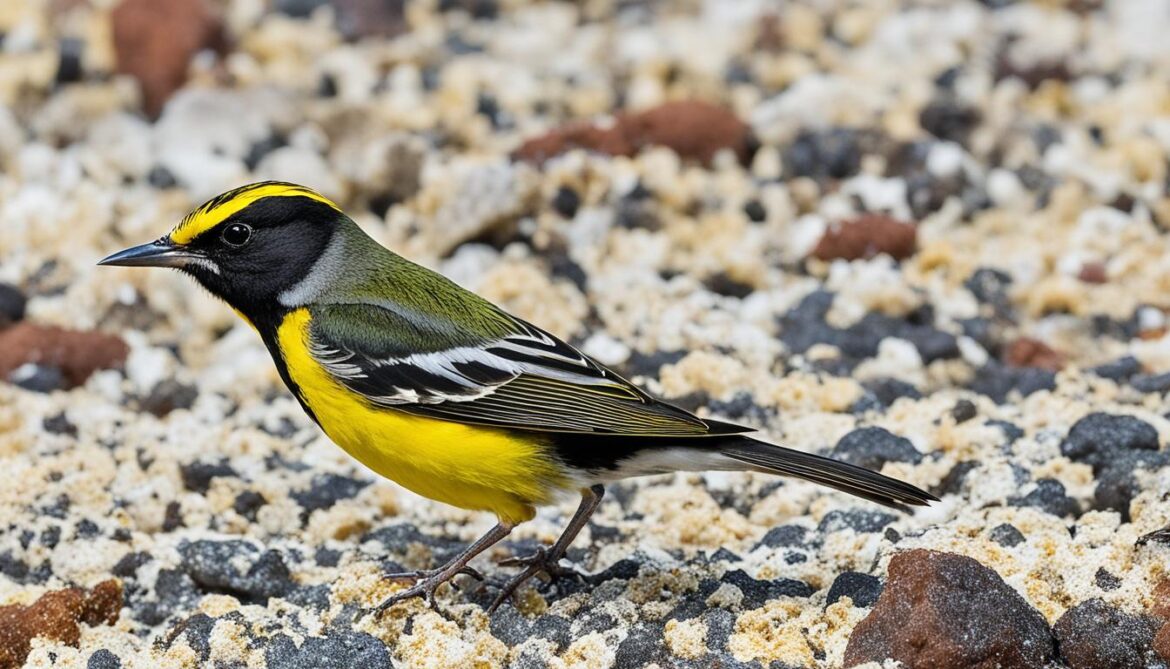
Conclusion
Cape Verde’s sacred natural sites and biodiversity demonstrate the country’s unwavering commitment to preserving its rich natural and cultural heritage. With its diverse landscapes, unique wildlife, and historical treasures, Cape Verde offers visitors a remarkable opportunity to experience the beauty and significance of this extraordinary destination.
Conservation efforts, eco-tourism initiatives, and environmental stewardship are driving sustainable development in Cape Verde. By integrating biodiversity conservation and cultural preservation, the country is successfully striking a harmonious balance between economic growth and environmental protection.
As travellers explore the natural wonders of Cape Verde, they actively contribute to the conservation journey, supporting the ongoing preservation of this remarkable place for future generations. Cape Verde’s commitment to sustainability ensures that its natural and cultural treasures will endure, captivating and inspiring visitors for years to come.
FAQ
What is the importance of Cape Verde’s sacred natural sites and biodiversity?
Cape Verde’s sacred natural sites and biodiversity are essential for the preservation of the country’s unique ecosystems and cultural heritage. They contribute to the balance of the environment, provide habitats for endangered species, and offer opportunities for sustainable tourism.
How is Cape Verde preserving its cultural landscapes?
Cape Verde is actively working to preserve its cultural landscapes by integrating biodiversity conservation, cultural heritage preservation, and sustainable tourism into its strategies and plans for future development. Efforts are also being made to raise awareness about the importance of cultural heritage and involve local communities in conservation initiatives.
What measures are being taken to protect endangered species in Cape Verde?
Cape Verde has established wildlife conservation initiatives that focus on research, monitoring, and habitat preservation. Local organizations and conservation projects enforce fishing regulations, protect marine ecosystems, and raise awareness about the importance of wildlife conservation to ensure the survival of endangered species.
How is eco-tourism promoted in Cape Verde?
Eco-tourism initiatives in Cape Verde promote responsible travel and minimal impact on the environment. Activities such as snorkeling, diving, and wildlife observation are popular, and local communities play an active role in providing authentic cultural experiences. These initiatives contribute to the economic development of Cape Verde while preserving its natural heritage.
What is the importance of environmental stewardship in Cape Verde?
Environmental stewardship is crucial for the long-term sustainability of Cape Verde’s natural resources. Efforts are being made to increase environmental awareness, promote responsible practices, and empower individuals and communities to participate in sustainable development. By fostering a sense of responsibility towards the environment, Cape Verde aims to ensure the preservation of its natural heritage.
What makes Blue Eye Cave in Cape Verde special?
Blue Eye Cave, located on the island of Santiago, is a captivating natural wonder known for its stunning blue waters and ethereal patterns of light and shadow. It offers visitors the opportunity to explore hidden chambers, encounter marine life, and experience the cultural significance of the cave for the local community.
What is the cultural significance of Blue Eye Cave?
Blue Eye Cave holds cultural and historical significance for the people of Cape Verde. It is believed to be a gateway to the spirit world, where ancestral spirits reside. The entrance of the cave is a gathering place for traditional rituals and ceremonies performed by the local community, connecting them with their cultural and spiritual heritage.
How is Blue Eye Cave being protected?
Conservation efforts are underway to protect the fragile ecosystems surrounding Blue Eye Cave. Local organizations are actively monitoring water quality, enforcing fishing regulations, and raising awareness about the importance of marine conservation. These efforts aim to preserve the natural beauty and cultural significance of the cave for future generations.
What is the significance of Cidade Velha in Cape Verde?
Cidade Velha, located on the island of Santiago, is a UNESCO World Heritage site that symbolizes Cape Verde’s history of European colonial presence in Africa and the history of slavery. It features original street layouts, churches, a fortress, and a marble pillar, showcasing the lasting impact of colonization on the country.
How is Cape Verde preserving its natural and cultural heritage?
Cape Verde is prioritizing the preservation of its natural and cultural heritage by integrating biodiversity conservation, cultural heritage preservation, and sustainable tourism into its development plans. This balanced approach aims to celebrate Cape Verde’s rich history, diverse ecosystems, and traditional practices.
Source Links















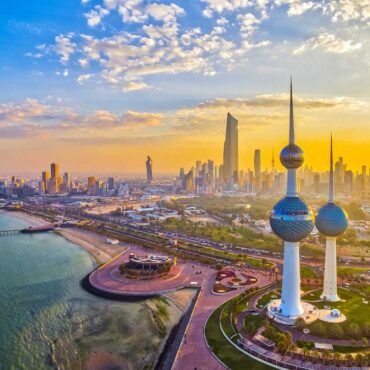









Post comments (0)